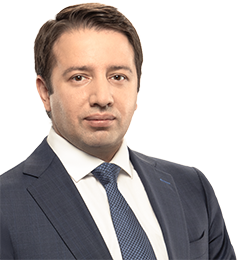Highlights of the Three-Year Application of Russia’s Counter-Sanctions Procedural Rules: Extremely Broad Scope and New Challenges for Foreign Business
22 January 2024Dear Ladies and Gentlemen, In 2020, Articles 248.1 and 248.2 of the Russian Arbitrazh (State Commercial) Procedure Code (“APC RF”) took effect to provide additional judicial protection for Russians due to foreign sanctions (restrictive measures). We have addressed these new statutes, their initial application by Russian courts, as well as the precedent-setting Russian Supreme Court ruling in the Uraltransmash v. PESA case in our previous newsletters.
As we summarize the results of the three-year application of these new statutes, we would like to share with you a brief overview of the courts' approaches to their scope, as well as the new challenges for foreign businesses associated with the growing trend of transferring sanctions disputes to Russian courts.
1. Further expansion of the scope of application
Article 248.1 of the APC RF originally provided for the exclusive jurisdiction of Russian courts with respect not only to (i) disputes involving persons under sanctions (subjective criterion), but also (ii) disputes arising from restrictive measures (objective criterion).
1.1In this regard, Russian courts currently acknowledge their jurisdiction by focusing not only on the sanctioned status of the persons involved in the proceedings, but also in relation to:
- Disputes arising from sanctions1See VELCO-2000 v. Codesta Engineering, Case No. A40-12364/2023; A1 v. Credit Suisse, Case No. A40-191489/2022., including those related to the imposition of sectoral (rather than personal) sanctions2See Loko Bank v. FITCH RATINGS CIS LTD, Case No. A40-121362/2022.(A)
- Disputes involving persons who refer to foreign restrictive measures of a nonpersonal nature against all Russian persons (travel bans, bank transfer restrictions, etc.) or sanctions against the Russian Federation as a whole3See Palitra v. Rizzani, Case No. A40-75861/2022; Administration of the Sovetsk City District v. Administration of the Lithuanian Municipality, Case No. A21-10438/2022; TVSZ v. TD EPC, Case No. A56-17017/2023; SAO VSK v. HUK-COBURG, Case No. A40-142282/22.(B)
- Tort disputes related to foreign restrictive measures, such as the temporary blocking of foreign assets whose ultimate owners are non-sanctioned Russian persons and entities4See, for example, Case No. A40-205635/22 against the international depository Euroclear Bank SA\NV.(C)
As such, a dispute may be unilaterally transferred to the jurisdiction of a Russian court not only by a non-sanctioned counterparty of a foreign person or entity, but also by a third party with which such person or entity does not have any contractual relations. We do not rule out that the scope of Article 248.1 of the APC RF will only expand over time.
1.3Moreover, in such a case, the hotly debated issue of whether or not Russian persons involved in sanctions disputes have access to justice abroad may become irrelevant due to the application of the objective rather than subjective criterion of Article 248.1 of the APC RF.
1.4
2. New challenges: reverse piercing of the corporate veil, enormous astreinte, and enforcement in neutral jurisdictions
Reverse piercing of the corporate veil
2.1
Since the cases against Google5See: Cases No. A40-155367/2020; No. A40-132383/2021., Russian courts have started to hold subsidiaries located in Russia or third countries (e.g., Hong Kong) jointly and severally liable for claims against their foreign parent companies. For example, similar cases resulting in joint and several liability of a parent company and its subsidiary were commenced against CITIBANK in Cases No. A40-167352/2023 and No. A40-158893/2023 and against Siemens in Case No. A40-195006/2022.
At the same time, the subsidiaries were not parties to the contracts between the claimants and the parent companies, and the grounds for holding them jointly and severally liable varied from jointly causing harm to the impossibility of separating the services provided.
It is obvious that in this way the claimants are trying to increase the chances of enforcing Russian judicial acts, including in foreign neutral jurisdictions that have not imposed sanctions on Russia and where the foreign respondents may have significant assets.Accrual of astreinte without any cap or limitations
2.2
The cases against Google have set another trend in sanctions litigation in the form of accrual of astreinte (penalty) for failure to voluntarily execute a judicial act in favour of the claimant using a progressive scale and without any cap6See: Cases No. A40-18637/23, No. A40-240440/22, No. A41-33877/13; No. A27-10877/2013.. As a result, the amount of the accrued astreinte, for example, in the case against Twitch and Amazon (No. A40-240440/22), has already reached USD quintillions (1018).
This is particularly important in light of the provisions of Article 248.2(10) of the APC RF, which provide for a separate astreinte for violation of the Russian anti-suit injunction, which Russian courts also grant in such disputes in accordance with Art. 248.2 of the APC RF7See, for example, Cases No. A40-51964/2022; No. A40-156736/2020..Enforcement of Russian judicial acts abroad, including in neutral jurisdictions
2.3
At the same time, the absence of assets on the territory of the Russian Federation is not a guarantee of the unenforceability of Russian judicial acts rendered based on this new legislation.
At the moment, claimants are actively attempting to recognize and enforce such court decisions in neutral jurisdictions that have not imposed sanctions on Russia (e.g., in China). In this regard, the presence of assets in such countries in any form, including in the form of accounts receivable, IP-rights, etc., may become an additional risk for foreign business.
3. New challenges: reverse piercing of the corporate veil, enormous astreinte, and enforcement in neutral jurisdictions
To litigate or not to litigate, that is the question
Given the trends described above, the absolute refusal to participate in such Russian litigation is becoming increasingly risky for foreign respondents. At the very least, it makes sense to assess the advisability of any form of participation (depending on the chances of success) on a case-by-case basis:- From minimal participation solely for the purpose of challenging the jurisdiction of the Russian court(A)
- To full-scale participation in the dispute, including the presentation of a position on the merits of the dispute, but with all the necessary reservations on the non-recognition of the Russian courts’ jurisdiction without prejudice (depending on the chances of success on the merits of the dispute)(B)
Such litigation strategies may mitigate the risks of foreign courts enforcing Russian judicial acts rendered on the basis of Art. 248.1 and Art. 248.2 of the APC RF.
3.1Foreign courts’ assistance in challenging the jurisdiction of Russian courts
3.2
For the same purpose, foreign respondents should also bear in mind such well-known remedies as anti-suit and anti-anti-suit injunctions, which may be granted by competent foreign courts (if applicable).
For example, the England and Wales High Court has recently granted both an anti-suit injunction and an anti-anti-suit injunction with regard to a sanctions-related dispute pending before a Russian court (Renaissance Securities (Cyprus) Ltd v Chlodwig Enterprises Ltd & Others [2023] EWHC 2816 (Comm)). Another example is a Hong Kong court’s decision in Linde v. RusChemAlliance [2023] HKCFI 2409).
See VELCO-2000 v. Codesta Engineering, Case No. A40-12364/2023; A1 v. Credit Suisse, Case No. A40-191489/2022. See Loko Bank v. FITCH RATINGS CIS LTD, Case No. A40-121362/2022. See Palitra v. Rizzani, Case No. A40-75861/2022; Administration of the Sovetsk City District v. Administration of the Lithuanian Municipality, Case No. A21-10438/2022; TVSZ v. TD EPC, Case No. A56-17017/2023; SAO VSK v. HUK-COBURG, Case No. A40-142282/22. See, for example, Case No. A40-205635/22 against the international depository Euroclear Bank SA\NV. See: Cases No. A40-155367/2020; No. A40-132383/2021. See: Cases No. A40-18637/23, No. A40-240440/22, No. A41-33877/13; No. A27-10877/2013. See, for example, Cases No. A40-51964/2022; No. A40-156736/2020.
We hope that the information provided herein will be useful for you.



